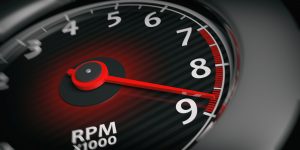The health of your engine is clear in its performance. From the driver’s seat, one way to assess your engine’s performance is by watching the RPM — or revolutions per minute. Essentially, this shows how hard your engine is working and how much fuel is being burned. When operating efficiently, the engine should rest with an RPM of around 700-1500 at idle, depending on the type of vehicle. As you accelerate, the RPM will rise until a gear shift happens, typically around 3,000-4,000RPM. When maintaining speed, your RPM should sit around 2,000-3,000. All of these metrics vary somewhat from one vehicle to the next, but in general, if you notice your RPM creeping upward, it can be an indication of engine problems that need to be addressed.

Common Timing and Causes of Unusually High RPM
Your RPM is running higher than usual — what can it mean? There are a few common causes of high RPM, depending on when you notice it. It’s also helpful to pay attention to other signs of trouble from your car, which could help you understand how to fix the problem.
When You First Start Your Car: The Engine is Burning More Fuel to Warm Up
Just after starting your car, the RPM may run higher than usual. This is because your engine is burning more fuel to help warm up. You should see the RPM gradually drop down to a normal range as your engine fully warms up. The good news is a slightly higher RPM just after starting your car is normal, especially during the cooler months.
During Idle: A Bad Idle Control Valve or Faulty Fuse
One of the most common causes of high RPM when idling is a faulty fuse, which impacts the function of the idle control valve. The fuses in your car help protect wires and electrical components from overcurrent or short-circuiting. The idle control valve, also called the air bypass valve, helps the engine idle smoothly by allowing air to pass by the throttle plate. Check both the fuses and idle control valve in your car and replace any that are faulty.
During Idle: There’s a Computer Malfunction
Modern vehicles increasingly use control modules to manage the operation of key systems like the engine. These computers take in data from a variety of sensors, interpret it, and determine what needs to be adjusted within key systems. If there’s an issue with the powertrain control module, the idle speed may be misread, leading to fluctuations or higher-than-usual RPMs. The computer will have to be inspected and repaired if there are issues.
During Idle: Your Engine is Overheating
Have you checked your engine temperature? High RPM when idling can be an indication of an overheating engine. Check the level of your engine oil and coolant if you notice the engine is running hot, since these are the most common causes of overheating. If need be, top off these fluids and see if your RPM during idle goes back to a normal range.
During Idle: The Alternator is Faulty or Failing
The alternator is responsible for transferring power from the engine out to components like the battery, power steering, and air conditioning. If it’s malfunctioning and those components aren’t getting the power they need, the engine may try burning more fuel to compensate, driving up your RPM. Look out for trouble starting your car or issues with a frequent dead battery that could indicate alternator issues.
While Driving: It’s Time for New Spark Plugs
Once fuel makes it into the engine’s combustion chambers, spark plugs are responsible for igniting it at the right time. If you have one or more faulty spark plugs, it can lead to improper combustion, making the engine work harder and attempt to burn more fuel than necessary. Check for any worn or faulty spark plugs and have them replaced to see if that improves your engine’s RPMs.
While Driving: A Faulty Throttle Pedal Position Sensor
A key sensor in engine function is the throttle position sensor (TPS), which receives information about the throttle’s position and sends it to the electronic control module (ECM). If this sensor is worn or faulty, it can lead to sudden idle surges, bucking or jerking while driving, hesitation during acceleration, a dip in fuel economy, and engine stalling.
During Idle & While Driving: There’s a Vacuum Leak
The engine relies on proper pressurization. If a vacuum leak develops, it can throw off airflow, impacting the function of your engine and exhaust system. You’ll likely notice a dip in fuel economy and a hissing sound alongside consistently higher-than-normal RPMs. Over time, you may also see the Check Engine Light come on or experience engine stalling.
Trust AAMCO with Your Next Engine Repair Service
Don’t let engine trouble like high RPMs hold you back. Visit your local AAMCO Boardman auto shop and our expert mechanics will ensure each essential system in your vehicle is operating efficiently. Our Total Car Care services mean we value a holistic approach, understanding how the health of one system impacts each other component in your vehicle. Find out why we’re a trusted name in car care — give us a call or schedule your appointment with us online today!
